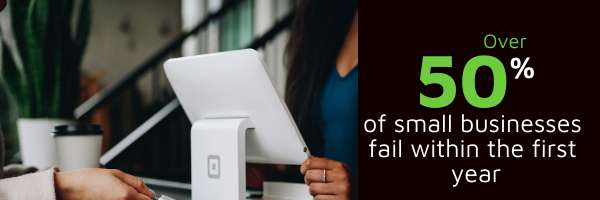So, you want to start a small business. You have an innovative idea, you have chosen a name for your business, and you are excited about the prospect of how it can improve your future. However, if that was all it took to become a thriving entrepreneur, anyone could do it.
Running your own business is a major undertaking. While it can be one of the best financial opportunities of your life, it’s also a high-risk endeavour that must be considered carefully— more than 50% of small business ventures fail within the first year. However, with thoughtful planning and preparation, you can turn your business into a success.
Before you start your own small business, ask yourself the following questions. If you’re unsure about your answer, it may be time to pause and reevaluate your approach before moving full steam ahead. Even if it takes you a bit longer to get up and running, your future self will thank you for taking the necessary steps to get your business off on the right foot.
Here are four things you should consider before starting your own business:
Do you have a business plan?
A business plan is the single most important way to prepare for starting a business. This is because your business plan will act as a roadmap, detailing what your business goals are, how you will run your business, and what actions you will take to grow your company.
Some important aspects to cover in your business plan include:
- Business formation: You will need to choose a business name, determine what types of business entity you need to create, and formally register your business with the state.
- Product/service details: A business is only as good as it’s product or service, which is why you need to have a well thought out product or service idea that you can execute on.
- Consumer profiling: Without a consumer for your product or service, your business is dead in the water. According to CB Insights, 42% of businesses fail due to lack of market demand. That’s why it’s important to have an understanding of who your target audience is—and be able to prove that it exists if you are looking for support from external sources.
- Marketing: Spreading the word about your business is critical to your success. While word of mouth is valuable and effective, you will also need to do some of the work, whether that be placing paid search ads, social media marketing, email marketing, etc.
- Funding: Even if you are using your personal savings to get your business started, you will still need to lay out a plan for future funding. Typically, business owners need to turn to banks and investors as the company expands and requires more capital.
- Sales: How will you sell your products or services? What are your sales goals for the first month, first year, etc.? Having these answers will help you forecast and scale your business.
Your business plan can and should evolve over time as your business grows. As your company becomes larger and more profitable, it is important to also consider legacy planning and business succession. For example, establishing a will or trust (or both) to help divide your assets and name who you wish to take over the business should something happen to you.
Are you financially stable enough to withstand the cost of starting a business?
Starting a small business is accompanied by a significant financial risk that can affect you personally. As a small business owner, you are on the line for the company’s success and shortfalls. And when available capital is tight, you are the one who is responsible for finding ways to fund it.
Before you invest any money in a business idea, it is important to consider whether you will be able to sustain the financial needs of the endeavor.
- Do you have sufficient capital to account for monthly fixed and variable expenses?
- How will you keep the business afloat if you don’t meet sales goals for one or more months?
- Have you established an emergency fund?
According to a study by U.S. Bank, 82% of business failures are due to poor cash flow management, which is why it is essential for you to not only understand the financial aspects of business ownership, but properly plan for them.
What do you know about starting a business?
Learning as much as you can about starting and running a business before you launch can save you a lot of time, frustration, and money. Fortunately in the digital age of today, there are virtually endless resources for those who are interested in starting their own small business, all you have to do is look.
Here are some resources you can use as a starting point:
- Small Business Administration
- National Federation of Independent Business
- Your local government site
- Your state’s business guidance site
Whether you are trying to learn more about opening based on the current economy (for example, delaying your grand opening date or changing operations due to COVID-19) or need pointers on a certain aspect of business ownership (like help establishing your corporate bylaws), you should be able to find free resources that answer any questions you may have.
Is the timing right?
As they say, timing is everything, especially when it comes to starting a business. From recessions to overly saturated markets, there are many factors that come into play when it comes to determining whether it’s a good time to open a business. Plus, you must also consider your personal circumstances.
How do you know if it’s the right time to start your business? Ask yourself these questions:
- Do you have the time to invest in getting your business off the ground and running?
- What is the state of the economy?
- Are other major lifestyle changes occurring at the same time (marriage, children, etc.)?
- Is your job and income stable?
- Is there real estate available where you want to open a storefront?
- Are you planning any trips that may interfere with business operations?
- Do you have an established support system ready to help?
Are you ready to launch your business?
These are just some of the important factors to consider when getting ready to establish a new small business. Keep in mind that a business takes a lot of time and effort as well as personal sacrifice. You should be passionate about your idea and be willing to put the energy into making it a success. If you are, you’ll be that much more to succeed.
Alexis Maness
Alexis Maness has a Bachelor of Science in Integrated Marketing Communications and is a contributing editor for 365businesstips.com. As a professional content writer, she has over five years of experience and is a contributing writer for several San Diego magazines. Alexis specializes in topics related to business, marketing, finance, and hospitality and tourism.



